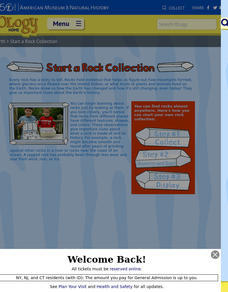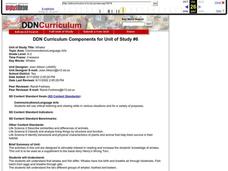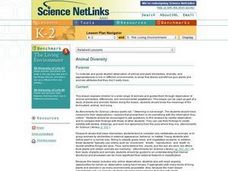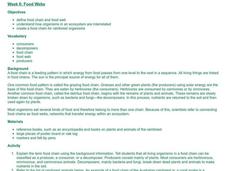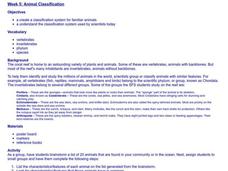Scholastic
Minibeasts
Lead young scientists to discover insects outdoors. After investigating, students will record observations, learn about these fascinating creatures, craft, and role play.
American Museum of Natural History
Start a Rock Collection
Rocks hold evidence of Earth's past. A three-step guide describes the process of creating a rock collection. It provides a data collection sheet to make notes about each sample.
Curated OER
November Science
Students review that all people, plants, and animals live on Earth. They classify objects found in the environment as living or nonliving.
Curated OER
Classification of Life
In this classification of life instructional activity, students use an on line source to answer questions about how species are classified, named and grouped. They give the classification of a bear, an orchid and a sea cucumber.
Curated OER
Mini-Ponds
In this mini pond worksheet, students create a mini-pond ecosystem with soil, water, and plant life. Students let their ecosystem sit for a day and they observe a sample the next day. Students identify all the pond water microorganisms...
Curated OER
Where are the Dinosaurs?
Students understand what it means when an animal is extinct. In this dinosaur lesson, students create dinosaur dioramas showing their habitat and what in their environment might make them become extinct. students pay particular attention...
Curated OER
Sedimentary Rocks
Fourth graders discuss the basic properties of rocks, the processes
involved in the formation of soils, and the needs of plants provided by soil. They write descriptions in their Science journal and identify and discuss each type of...
Curated OER
Classification of Cerealites
Middle schoolers create a dichotomous key. In this categorizing lesson, students create a dichotomous key for different types of cereal. Middle schoolers classify the cereal into groups such as flakes and cereal with holes. Students...
Curated OER
Seeds of Wetland Life
Students participate in several activities on seed exploration. In this biology lesson plan, students classify seeds according to their dispersal method. They explain the different adaptations plant have to disperse their seeds.
Curated OER
Exporing Our Community
Young scholars explore attributes of the community in which they live. They compare rural, urban and suburban communities and attempt to classify their own community. Each group illustrates their assigned area by drawing buildings,...
Curated OER
Sorting and Using Materials
Learners explore materials and their properties. In this matter lesson, students identify objects and describe their properties. Learners test and sort materials using an interactive whiteboard, followed by a group discussion of what was...
Curated OER
What's Your Genus? Scientific Classification and the VT
Students understand the definition of binomial nomenclature. In this binomial nomenclature lesson, students classify ordinary animals by seeking their scientific names. Students participate in a knowledge hunt using binomial nomenclature.
Curated OER
The Circle of Life
Fourth graders examine how the different organisms living in an ecosystem affect one another. In groups, they research a specific ecosystem and present their findings to the class based on the type of organisms found in it. To end the...
Curated OER
Visit the Rainforest
Fifth graders define what a tropical rain forest is, what animals and plants exist there and realize how important the tropical rainforests are to life on Earth. They work in pairs to access websites imbedded in this plan to research the...
Curated OER
Whales
Learners compare the differences between whales and fish. They examine the differences of toothed and baleen whales. They identify behavioral and physical characteristics of animals that help them survive in their habitat.
Curated OER
"Habitats"
Learners complete a unit of lessons on animals and animal conservation. They observe a square meter of ground outside the school, set up a model environment, analyze an owl pellet, grow bread mold, and explore various websites.
Cornell University
Classification
Explore the scientific method of classification. An interactive activity asks learners to create a classification system for a group of objects and develop a flow chart to communicate their systems. In addition, individuals use a...
Curated OER
Creature Features
Students examine why certain animals live in only specific places throughout the world. Using animals, they classify them based on their characteristics and identify their basic needs. They also observe and compare the life cycles of...
Curated OER
Environmental Conditions: Friend or Foe
Students research and answer questions on how organisms are classified and how their needs are met through their environment. They work in small groups and create a poster, chart, rap, PowerPoint, or brochure demonstrating how organisms...
Curated OER
Marshland Ecosystem
Students classify animals based on their physical characteristics and eating habits. In this animal identification lesson plan, students investigate the life forms shown on a Parisian ceramic basin, and discover ecosystem the artist was...
Curated OER
Biodiversity
In this biodiversity learning exercise, students sort and classify animals by their observable features using a dichotomous key. Students then respond to questions about complete and incomplete metamorphosis.
Curated OER
Animal Diversity
Students use the Animal Diversity E-Sheet to access the Where Can Animals Live? online book.
Curated OER
Food Webs
Students research rainforest animals and use that information to make a flow chart to show the order in which energy is transferred through several organisms. They label the producers, consumers, and decomposers in their chart.
Curated OER
Animal Classification
Students list characteristics and features of animals found in their community. They then group the animals according to how they are similar and different and create names for each group. They then create a chart of their...



